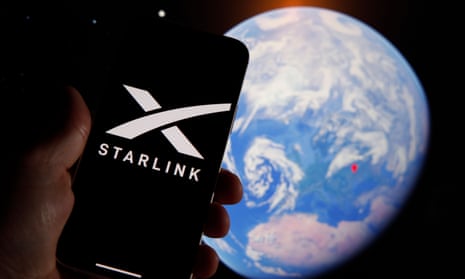Dan Milmo

US officials are considering whether to subject some of Elon Musk’s business ventures to national security reviews, including his proposed acquisition of Twitter and his satellite internet company Starlink, according to a report.
Bloomberg wrote on Friday that Biden administration officials were concerned by the Tesla chief executive’s plan to buy Twitter in a deal part-funded by non-US investors and his recent threat to pull the plug on the Starlink service to Ukraine, as well as the publication of a series of tweets containing proposals over the Ukraine conflict favourable to the Putin regime.
The report said US officials were concerned by Musk’s plans to buy Twitter with the financial support of non-US investors, including: the Saudi Arabian investor Prince Alwaleed bin Talal Al Saud; Qatar Holding, which is part of the Qatar Investment Authority; and Binance, the world’s largest cryptocurrency exchange, whose holding company is registered in the Cayman Islands. At the time, the financial support of Musk’s co-investors was worth about $7bn.
The White House however, denied talk of a security review. The national security spokesperson, Adrienne Watson, said: “We don’t know of any such discussions.”
Musk is working to complete a proposed $44bn acquisition of Twitter ahead of a court-imposed deadline of 28 October, after which he faces the threat of legal action from the social media platform to force him to close the deal.
Bloomberg wrote that one avenue available to the Biden administration to investigate Musk’s ventures was the Committee on Foreign Investment in the United State (CFIUS), which can review business deals and recommend that the president suspend or block a transaction.
In response, Elon Musk flagged a tweet on Friday that cited the Bloomberg report and said it would be “hysterical if the government stopped Elon from over-paying for Twitter”. Musk responded with a laughing emoji and the 100 emoji, indicating support for the post.
It is not clear on what basis Starlink, part of Musk’s Space X rocket business, would be scrutinised by the committee.
On Saturday, Elon Musk announced SpaceX would continue to pay for Starlink’s internet service in Ukraine, a day after suggesting he could not keep funding the project, which he said was losing about $20m a month. Starlink, which operates via a constellation of 3,000 small satellites in low-Earth orbit, has become a key communications link for the Ukrainian army in its fight to repel the Russian invasion. There are now about 25,000 Starlink ground terminals in Ukraine, according to Musk.
Musk alarmed the government in Kyiv this month when he published a Twitter poll on the future of the country, with options including formalising Russia’s annexation of Crimea. In response, Ukraine’s president, Volodymyr Zelenskiy, tweeted: “Which @elonmusk do you like more?” and offered two responses: the Musk who supports Ukraine, or who supports Russia.
Privacy Notice: Newsletters may contain info about charities, online ads, and content funded by outside parties. For more information see our Privacy Policy. We use Google reCaptcha to protect our website and the Google Privacy Policy and Terms of Service apply.
The US Treasury said: “CFIUS is committed to taking all necessary actions within its authority to safeguard U.S. national security. Consistent with law and practice, CFIUS does not publicly comment on transactions that it may or may not be reviewing.”
Howard Fischer, a partner at New York law firm Moses & Singer, said he did not expect a CFIUS investigation to hamper the Twitter deal.
“I am sceptical that CFIUS review is going to be employed to stop or significantly pause the deal,” he said. “Musk would argue that he is being punished for his speech, not the presence of foreign investors in the deal, especially given the relatively smaller size of that reported foreign investment.”
Elon Musk has been contacted for commented.
You've read 24 articles in the last year
Thank you for joining us from India.
Where will it all end? The conflict in Ukraine appears further than ever from resolution. Nuclear threats, mass graves, the sense that both sides are “all in”.
It’s our job at the Guardian to decipher a rapidly changing landscape, and report the facts in sober fashion, without getting carried away. Our correspondents are on the ground in Ukraine and Russia and throughout the globe delivering round-the-clock reporting and analysis during this fluid situation.
We know there is no substitute for being there – and we’ll stay on the ground, as we did during the 1917 Russian Revolution, the Ukrainian famine of the 1930s, the collapse of the Soviet Union in 1991 and the first Russo-Ukrainian conflict in 2014. We have an illustrious, 200-year history of reporting throughout Europe in times of upheaval, peace and everything in between. We won’t let up now.
Tens of millions have placed their trust in the Guardian’s fearless journalism since we started publishing 200 years ago, turning to us in moments of crisis, uncertainty, solidarity and hope. We’d like to invite you to join more than 1.5 million supporters from 180 countries who now power us financially – keeping us open to all, and fiercely independent.
Unlike many others, the Guardian has no shareholders and no billionaire owner. Just the determination and passion to deliver high-impact global reporting, always free from commercial or political influence. Reporting like this is vital to establish the facts: who is lying and who is telling the truth.
And we provide all this for free, for everyone to read. We do this because we believe in information equality. Greater numbers of people can keep track of the events shaping our world, understand their impact on people and communities, and become inspired to take meaningful action. Millions can benefit from open access to quality, truthful news, regardless of their ability to pay for it.
Every contribution, however big or small, powers our journalism and sustains our future
No comments:
Post a Comment